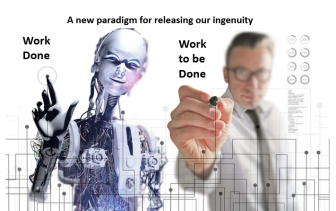
Much of what we read about artificial intelligence, deep learning and robots can present fear of a new paradigm that our jobs are simply going, or vanish fairly soon, so we should find ways to release our human ingenuity.
Technology, machines and information solutions will take over in this new world of accelerating technology with the concern of “so then, what do we do?
Well, I believe we have a real chance to, at last, celebrate. Yes celebrate, we can finally be liberated! Ever since the industrial revolution, we have been caught up in the productivity and efficiency trap, in the monotony of repeating work.
Today we are on the cusp of changing that. Can you imagine all those boring, repetitive jobs we are faced with today can be simply handed over to machine intelligence, just happy to do the task at hand?
Surely, if we manage this correctly it can release us up, it can enable our ingenuity to thrive and the answer lies in the work to be done Continue reading “A new paradigm of focusing on ingenuity lies in work to be done”